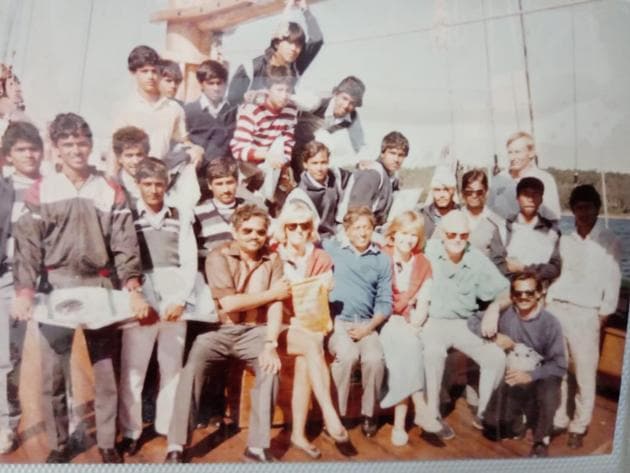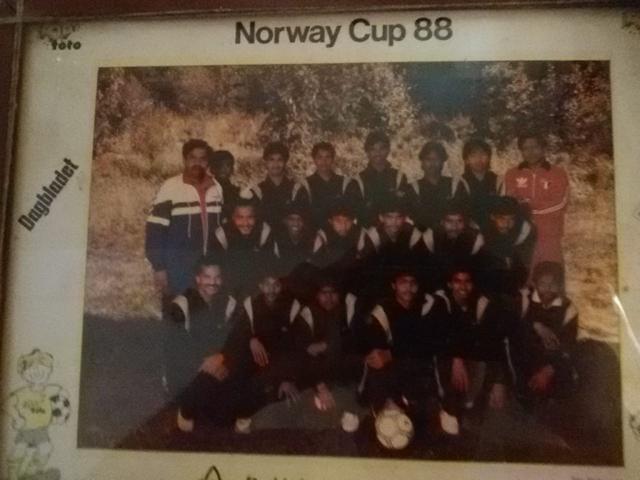Grace, glamour and Goswami: TFA cadets look back in wonder at the Chuni years
Goutam Ghosh and Godfrey Pereira, two from the first batch of the Tata Football Academy, remember their technical director.
Goutam Ghosh is fuzzy with the year---could be 1994 or 1995, he says---but it is a Chuni Goswami story burned into his mind. “Chuni Sir was the only person who did not stand up when Ajit Wadekar, Mohammad Azharuddin and the chief general manager of our bank walked in. He sat one leg on another in the front row. From a distance they greeted him with a ‘namaste’,” says the cadet of the first batch from the Tata Football Academy (TFA).

As teenagers, Ghosh and 23 others including Godfrey Pereira, Aloke Das, Carlton Chapman, Toushif Jamal---international footballers all --- saw Goswami for three years as TFA’s technical director (1987-90). Mohammed Habib was coach.
The story doesn’t end there. “Wadekar and Azharuddin (both employees of the bank) asked Sir to come on stage but he didn’t. When Wadekar spoke, it was mostly about Sir---how in a practice game against West Indies he played keep-uppy with a cricket ball; the host refusing payment for a broken window pane because it was a shot from Chuni’s bat that did the damage and more. Azhar too spoke a lot about Sir who was nearing 60 then. The respect he commanded among such icons left me, a young India and Mohun Bagan player, wonderstruck,” says Ghosh.
In Mumbai for the Rovers Cup, Ghosh says he saw Azharuddin touch Goswami’s feet as a mark of respect.
Goswami, who died on Thursday aged 82, had left the bank by the time Ghosh joined but he had heard another story about India’s captain of the 1962 Asian Games gold medal winning team. “He was asked to help in getting a big corporation to move its business to our bank. As he drove to their office, word got out that Chuni Goswami was coming to the area. It created a traffic situation that needed police intervention. The account came to our bank in 10 days.”
When the TFA cadets went to Germany---“Sir was clear that exposure tours were needed for callow youngsters so we would go to Sao Paulo and Europe every year,” says Ghosh---in 1988, Goswami showed he was equal to a director of FC Cologne in his knowledge of football. “And didn’t he look smart in a sharp suit!”

Sartorial elegance Pereira remembers too. “I have never seen him in a crumpled shirt; even his pyjamas while sleeping at night would be ironed,” says the former India player. The first time they met, Pereira says: “He came sporting a wonderful suit and boots, wearing a scarf like how Rishi Kapoor and some other actors did. I went, ‘wow, this is a gentleman.’”
Ghosh recalls that meeting too, on their first day at TFA. “He inquired if we were comfortable. I didn’t know much about him and those who weren’t from Bengal possibly knew even less. But this, our parents had said: he was the last word on football.”
Goswami stayed with the boys at lodgings near the Keenan Stadium in Jamshedpur. “Whenever he spoke it was with a smile. He used to speak fluently in English, Bengali and Hindi,” says Pereira. Though he watched the cadets train twice daily, Goswami rarely stepped on the pitch. “And when he did, usually in jeans and a tee, it would be after seeking Habib Sir’s permission. Yet, I vividly remember a practical class he took in crosses and volleys,” says Ghosh.
Life lessons
Goswami’s lessons were instead focused on shaping the teenagers’ personalities. “He ensured classes in spoken English and taught us table manners. He could pick the bones of a small piece of hilsa in his mouth. He would tell us, one day we will play for India and we must learn to carry ourselves,” says Ghosh.
To that end, TFA cadets would have sports psychologists visiting, says Ghosh. “This, in the 1980s!” It wasn’t the only time the boys saw Goswami’s foresight. “I had scored my first hat-trick in Norway (1988). Chuni ‘da’ was impressed and said, ‘You will play for India one day’. So, the day I played my first game for India (1992), I called him and said, “Your blessings are with me,” says Pereira.
Goswami also encouraged public speaking sessions. “It could be about anything and it built confidence. Today, as a coaching instructor I find those lessons handy,” says Ghosh.
What Goswami never did was use the perpendicular pronoun. “He would never say, ‘I did this,’ never spoke of his playing days,” says Ghosh.
“We saw a facet of Sir’s personality few have: a person who would pat our cheeks and hug us. But we also saw he had the glamour of film stars like Uttam Kumar and Dilip Kumar,” says Ghosh.
A class apart, says Pereira.






